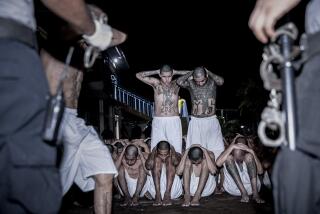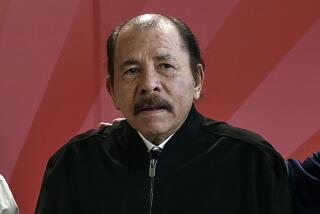Zimbabwe accused of continuing rights abuses
- Share via
JOHANNESBURG, SOUTH AFRICA — Amnesty International said Thursday that serious human rights abuses continue in Zimbabwe and criticized members of President Robert Mugabe’s ruling party, saying they regard violence as a useful political tool.
After a six-day trip to Zimbabwe, the group’s chief, Irene Khan, dismissed the government’s explanation that it lacked the funds to make improvements on human rights.
“Ending attacks on human rights defenders, lifting restrictions on the media and allowing public protests do not require more money. They only require political will,” she said in a statement.
Zimbabwe’s national unity government, formed in February to end an impasse over disputed elections last year, is hamstrung by the opposing political forces it contains. Prime Minister Morgan Tsvangirai, head of the Movement for Democratic Change and former opposition leader, is pushing for change. However, hard-liners in the security forces, still controlled by Mugabe’s ZANU-PF party, are bitterly resisting.
Activists are still being arrested and white farmers driven off their land, the Amnesty report says. The land is often given over to Mugabe backers.
Khan said no serious efforts had been made to reform the police, army, intelligence and other security agencies, or to prosecute those responsible for last year’s political violence. The Amnesty chief said senior ministers had told her it wasn’t a priority right now.
Her comments came as Tsvangirai was visiting Western nations asking for the large-scale development aid needed to repair Zimbabwe’s ruined infrastructure.
Tsvangirai has been embraced warmly during his trip, pointedly isolating Mugabe further. However, he has been promised only modest humanitarian assistance.
President Obama heaped lavish praise on Tsvangirai last week, citing the prime minister’s courage and tenacity, but offered just $73 million in assistance that will bypass the Zimbabwean government. German Chancellor Angela Merkel promised $35 million.
The unity deal, crafted by regional leaders, still allows ZANU-PF hard-liners who control the security forces to easily block reforms. Their political survival, analysts say, depends on the failure of the MDC and moderates in ZANU-PF willing to work with Tsvangirai.
Tsvangirai has argued that without significant Western assistance, the unity government has little hope of achieving any reforms. His government has promised to set up escrow accounts for foreign aid, rather than plowing it directly into the national budget. But the prime minister has not yet been able to sway most foreign donors.
On Thursday, the European Union promised to restore ties with Zimbabwe -- but only after violence is reduced, media freedom is honored and security forces are brought under the control of the government.
Amnesty International’s report underscores concerns about the continuing power of spoilers in Mugabe’s party.
“Persistent and serious human rights violations, combined with a failure to introduce reform of the police, army and security forces or address impunity and the lack of clear commitment on some parts of the government, are real obstacles that need to be confronted,” Khan said.
McDonald Lewanika, spokesman for the Harare-based rights group Crisis in Zimbabwe Coalition, said it was too early to provide funds to the government.
“We are urging Western governments to give aid and deepen it, aid for humanitarian assistance and also the education and health sectors,” he said. “But when we begin to talk about aid beyond that, or direct budgetary support for this inclusive government, it becomes a different story.
“I think this inclusive government needs to be supported,” he said. “We feel that Western governments can promise this kind of support but allow it to be predicated on certain things.”
--
More to Read
Sign up for Essential California
The most important California stories and recommendations in your inbox every morning.
You may occasionally receive promotional content from the Los Angeles Times.













